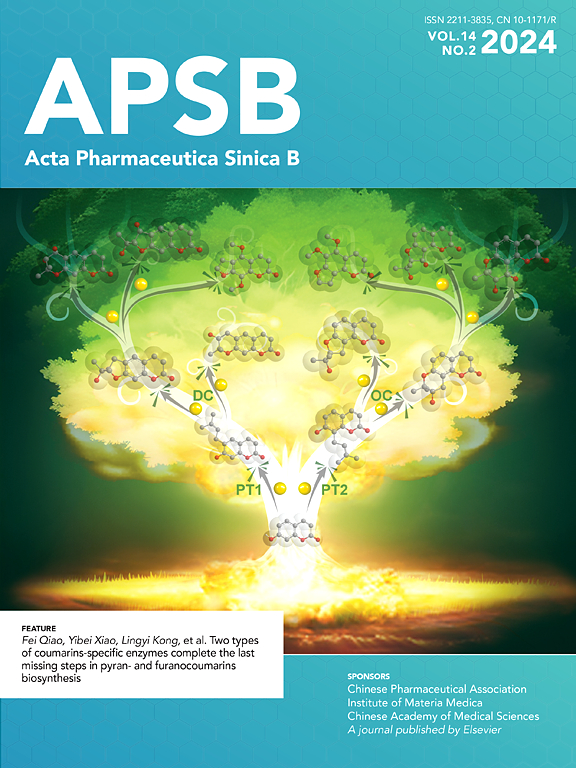Sulfafurazole dimers potentiate chemo-immunotherapy of low immunogenic breast cancer by preventing the PD-L1 exosomes secretion
IF 14.6
1区 医学
Q1 PHARMACOLOGY & PHARMACY
引用次数: 0
Abstract
The αPD-L1 antibody-based immune checkpoint blockade therapy is still limited by the poor clinical response rate as it is mainly utilized to block surface PD-L1 on tumor cells while ignoring abundant PD-L1 exosomes secreted in the environment, causing tumor immune evasion. Here, we proposed an exosome biogenesis inhibition strategy to suppress tumor exosomes secretion from the source, reducing the inhibitory effect on T cells and enhancing chemo-immunotherapy efficacy. We developed sulfafurazole homodimers (SAS) with disulfide linkages, effectively releasing the drug in response to glutathione (GSH) and inhibiting 4T1 tumor-derived exosomes secretion. Subsequently, gemcitabine (Gem) was encapsulated to induce immunogenic cell death (ICD). Consequently, Gem@SAS inhibited the secretion of tumor exosomes by more than 70%, increased proliferation and granzyme B secretion ability of T cells by more than 2 times, and showed superior efficacy in breast cancer treatment as well as lung metastasis of breast cancer.

磺胺呋唑二聚体通过阻止PD-L1外泌体分泌来增强低免疫原性乳腺癌的化学免疫治疗
基于αPD-L1抗体的免疫检查点阻断疗法主要用于阻断肿瘤细胞表面的PD-L1,忽略了环境中分泌丰富的PD-L1外泌体,导致肿瘤免疫逃逸,临床应答率不高。在此,我们提出了一种外泌体生物发生抑制策略,从源头上抑制肿瘤外泌体的分泌,降低对T细胞的抑制作用,提高化学免疫治疗的疗效。我们开发了具有二硫键的磺胺唑二聚体(SAS),有效释放药物以响应谷胱甘肽(GSH)并抑制4T1肿瘤源性外泌体的分泌。随后,包封吉西他滨(Gem)诱导免疫原性细胞死亡(ICD)。由此可见,Gem@SAS抑制肿瘤外泌体分泌70%以上,使T细胞增殖和颗粒酶B分泌能力提高2倍以上,在乳腺癌治疗和乳腺癌肺转移中表现出优越的疗效。
本文章由计算机程序翻译,如有差异,请以英文原文为准。
求助全文
约1分钟内获得全文
求助全文
来源期刊

Acta Pharmaceutica Sinica. B
Pharmacology, Toxicology and Pharmaceutics-General Pharmacology, Toxicology and Pharmaceutics
CiteScore
22.40
自引率
5.50%
发文量
1051
审稿时长
19 weeks
期刊介绍:
The Journal of the Institute of Materia Medica, Chinese Academy of Medical Sciences, and the Chinese Pharmaceutical Association oversees the peer review process for Acta Pharmaceutica Sinica. B (APSB).
Published monthly in English, APSB is dedicated to disseminating significant original research articles, rapid communications, and high-quality reviews that highlight recent advances across various pharmaceutical sciences domains. These encompass pharmacology, pharmaceutics, medicinal chemistry, natural products, pharmacognosy, pharmaceutical analysis, and pharmacokinetics.
A part of the Acta Pharmaceutica Sinica series, established in 1953 and indexed in prominent databases like Chemical Abstracts, Index Medicus, SciFinder Scholar, Biological Abstracts, International Pharmaceutical Abstracts, Cambridge Scientific Abstracts, and Current Bibliography on Science and Technology, APSB is sponsored by the Institute of Materia Medica, Chinese Academy of Medical Sciences, and the Chinese Pharmaceutical Association. Its production and hosting are facilitated by Elsevier B.V. This collaborative effort ensures APSB's commitment to delivering valuable contributions to the pharmaceutical sciences community.
 求助内容:
求助内容: 应助结果提醒方式:
应助结果提醒方式:


